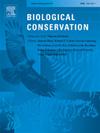The potential and limitations of turtle farming to contribute to conservation in the Brazilian Amazon
IF 4.4
1区 环境科学与生态学
Q1 BIODIVERSITY CONSERVATION
引用次数: 0
Abstract
Consumption of wildlife provides many rural residents with access to diverse and nutritious food, but this practice persists in urban areas. In the Brazilian Amazon, high demand for freshwater turtles has led to a growing number of management projects (e.g., protection of nesting beaches) in recent decades. National regulations were also established to allow wildlife farming as a conservation strategy, with a focus on turtles. Amazonas state (Brazil) has the largest turtle farm production output in Brazil, making it well-suited to evaluate the effectiveness of turtle farms in contributing to conservation. We evaluated three criteria for farming to contribute to conservation, as proposed by previous research: (1) whether farmed turtles are substitutes for wild-caught turtles, by looking at people's choices and perceptions of farmed versus wild-caught turtles; (2) whether prices of farmed turtles can compete with prices of wild-caught turtles; and (3) whether the current output from farms is large enough to have a significant effect on the current consumption of turtles. Our findings indicate that while turtle farms may meet the price criterion, people's choices of wild over farmed turtles hinder turtle farms from contributing to conservation. In addition, statewide farm production is approximately 2600 turtles annually. This covers about 2.5 % of consumption in studied sites, based on conservative estimates of one turtle consumed per household annually. Our results suggest that, as it currently stands, there is no evidence that turtle farming is making a significant contribution to the conservation of wild turtle populations in the Brazilian Amazon.
海龟养殖对巴西亚马逊保护的潜力和局限性
食用野生动物为许多农村居民提供了多样化和营养丰富的食物,但这种做法在城市地区仍然存在。在巴西亚马逊,近几十年来,对淡水龟的高需求导致了越来越多的管理项目(例如,保护筑巢的海滩)。还制定了国家法规,允许将野生动物养殖作为一种保护策略,重点是海龟。亚马逊州(巴西)拥有巴西最大的海龟养殖场产量,因此非常适合评估海龟养殖场在保护海龟方面的有效性。我们评估了以往研究提出的养殖对保护贡献的三个标准:(1)通过观察人们对养殖和野生海龟的选择和看法,养殖海龟是否可以替代野生捕获的海龟;(2)养殖龟的价格是否能与野生龟的价格竞争;(3)当前养殖场的产量是否足够大,对当前海龟消费量是否有显著影响。我们的研究结果表明,虽然海龟养殖场可能符合价格标准,但人们选择野生海龟而不是养殖海龟阻碍了海龟养殖场对保护的贡献。此外,全州每年的养殖产量约为2600只海龟。根据保守估计,每户家庭每年消耗一只海龟,这占研究地点消费量的2.5%左右。我们的研究结果表明,就目前而言,没有证据表明海龟养殖对巴西亚马逊地区野生海龟种群的保护做出了重大贡献。
本文章由计算机程序翻译,如有差异,请以英文原文为准。
求助全文
约1分钟内获得全文
求助全文
来源期刊

Biological Conservation
环境科学-环境科学
CiteScore
10.20
自引率
3.40%
发文量
295
审稿时长
61 days
期刊介绍:
Biological Conservation is an international leading journal in the discipline of conservation biology. The journal publishes articles spanning a diverse range of fields that contribute to the biological, sociological, and economic dimensions of conservation and natural resource management. The primary aim of Biological Conservation is the publication of high-quality papers that advance the science and practice of conservation, or which demonstrate the application of conservation principles for natural resource management and policy. Therefore it will be of interest to a broad international readership.
 求助内容:
求助内容: 应助结果提醒方式:
应助结果提醒方式:


